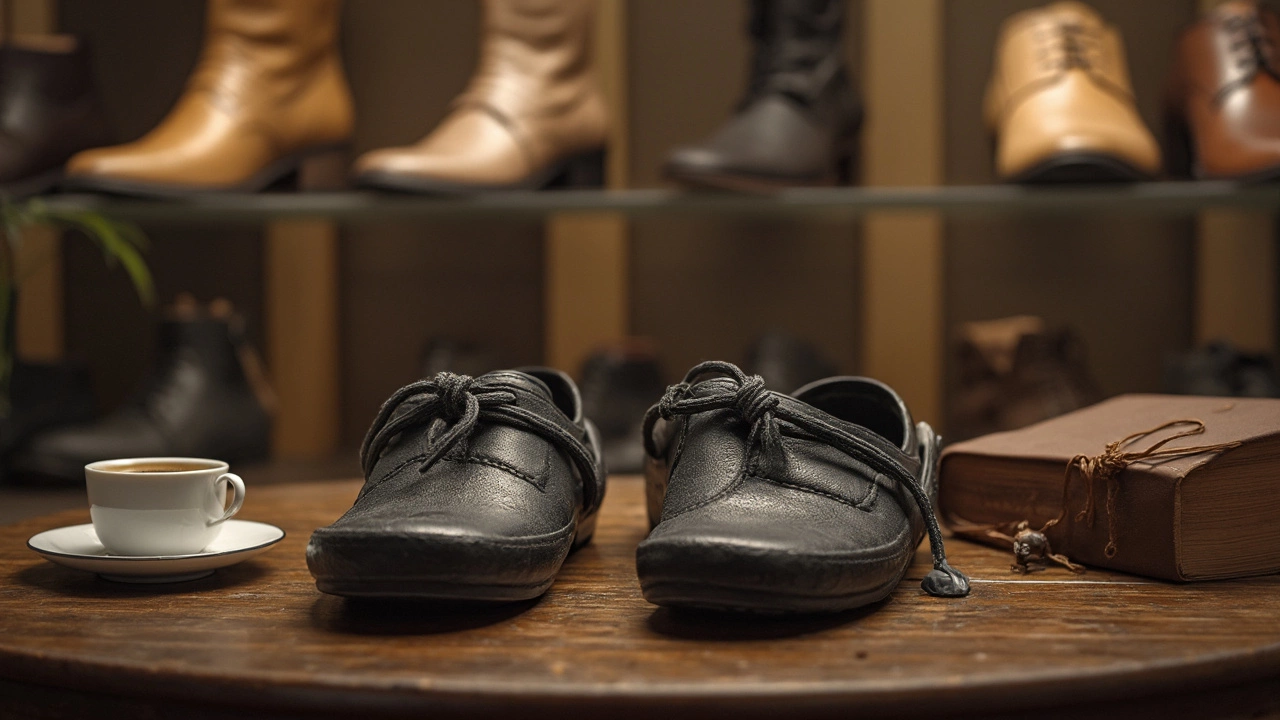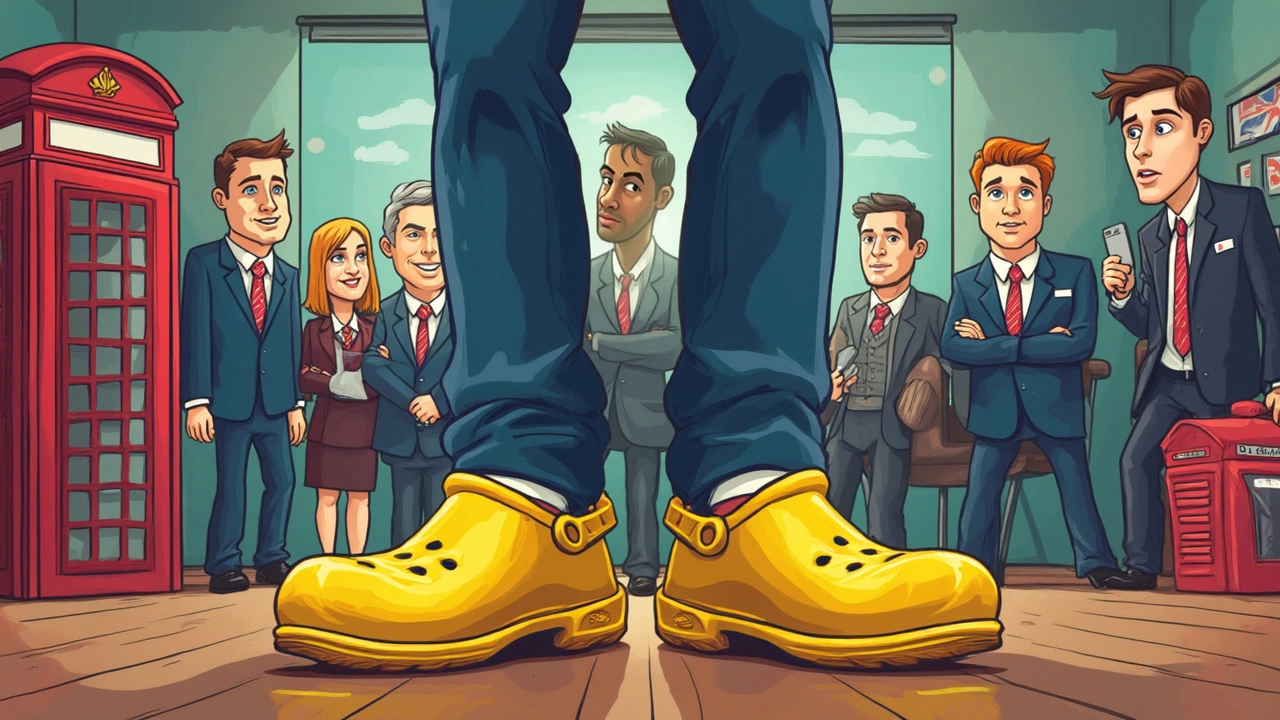So, you're wondering why you can't just slide into those comfy Crocs when heading to the office? Let's break it down. First up, most workplaces have these things called dress codes. They're basically guidelines to keep everyone looking professional and, in some jobs, to ensure safety. While your Crocs might be perfect for a lazy Sunday, they don't quite fit the bill for many of these standards.
Why do workplaces even care about shoes, you ask? Well, shoes can say a lot about how you present yourself. In many jobs, especially in an office setting, there's this unspoken rule that your appearance shows you're ready for business. Crocs, with their casual vibe, might send a different message, one that's too laid-back for some industries.
But it's not just about looks. Some jobs have specific safety requirements, like needing closed-toe shoes or slip-resistant soles, especially in environments like hospitals or kitchens. Crocs don't always tick those boxes, so they're not always the best choice. Plus, think about durability and how long you'd want those shoes to last if you're on your feet all day.
- Understanding Dress Codes
- The Role of Safety at Work
- Crocs and Business Culture
- Alternatives to Crocs
Understanding Dress Codes
The first thing to know is that dress codes are more than just a set of rules to follow. They're a reflection of a company's culture and values. If you're gearing up for work, whether it's in an office or retail, understanding these guidelines can help you fit seamlessly into the workplace environment.
Dress codes vary widely. You have your business formal, business casual, and casual. Each has its own set of wardrobe choices. Office footwear, in particular, plays a crucial role. In a business formal environment, shiny leather shoes or stylish pumps are often expected. Business casual might allow loafers, but comfortable shoes like Crocs usually fall outside most interpretations.
Why So Serious?
So why the fuss over something as simple as shoes? Well, employers want to project a certain image to both clients and competitors. The idea is to look polished and competent. Footwear can make a difference in how someone is perceived. Remember the saying, ‘Dress for the job you want’? It might be cliché, but many companies take it seriously.
Beyond looks, dress codes can cover practical reasons, too. Shoes need to be safe and durable for the tasks at hand. Some offices might not pay much attention to what shoes you wear, but others see it as essential to maintaining a consistent professional appearance.
Tip: Check the Employee Handbook
Before you rock up in anything potentially against the grain, like colorful Crocs, have a look through your employee handbook. This little guide is a detailed resource of what's okay and what's not. If you're unsure, ask around or pop a question to HR.
It's not all doom and gloom, though. Many companies are now embracing more casual standards, offering flexibility and room for personal expression while keeping the core values intact. Just be sure to know where your workplace stands before making any bold footwear choices!
The Role of Safety at Work
When it comes to choosing the right work shoes, safety is a big deal. Companies really care about keeping their employees safe, so the kind of footwear you pick can make a huge difference. This is especially true in industries where accidents are more likely, like construction or food services.
First off, let's talk about protection. In environments where heavy stuff might fall, or you might bump into things, having shoes that cover your toes is pretty important. Now, while Crocs are comfy, they often have that open-back or open-toe design which doesn't offer the best protection. Steel-toed boots or sturdy sneakers usually get the job done better in these cases.
Slip Resistance
Slip resistance is another point to consider. Wet floors or slick surfaces can be dangerous, especially if you're working in a kitchen or a lab. You need work shoes that grip the floor well. Quite a few Crocs models don't come with the kind of non-slip soles that are found on proper work shoes, which might be a dealbreaker for certain jobs.
Compliance with Safety Codes
Beyond just keeping you safe, many workplaces have safety codes set by organizations like OSHA (Occupational Safety and Health Administration). These rules often dictate what types of shoes are acceptable, focusing on factors like durability and support. Unfortunately for Crocs lovers, those foam clogs don't always fit the bill.
A quick look at safety stats can be revealing:
| Industry | Common Shoe Requirement | Frequent Safety Concerns |
|---|---|---|
| Construction | Steel-toed boots | Falling objects, sharp debris |
| Healthcare | Closed-toe, slip-resistant | Slips, trips, and biohazards |
| Food Services | Slip-resistant shoes | Wet floors, sharp tools |
So, while Crocs might be a breeze to wear walking around your house, when it comes to work, there are these safety factors that need some serious thought. Making the right choice isn't just about looking professional—it's about staying safe and complying with workplace protocols.

Crocs and Business Culture
When it comes to meshing Crocs with business culture, things get a bit tricky. Most workplaces value professionalism, and footwear plays a huge role in that. Office footwear should often reflect the seriousness of the work environment. Crocs, with their casual and playful look, might not send the right signal.
Consider the vibes in a corporate office. The attire is usually crisp and businesslike, from tailored suits to polished shoes. Imagine someone striding into a boardroom meeting wearing bright orange Crocs. The color and style can make those comfy clogs feel decidedly out of place among formal wear.
But it’s not just suit-and-tie places where this matters. Even in more relaxed environments, professional attire tends to maintain certain standards to reflect a unified brand and culture. Allowing everyone to wear whatever they please can lead to confusion or mixed messages about the company’s image—something many businesses try to avoid.
Cultural Perception of Crocs
In many people's minds, Crocs are linked to leisure and carefree times. Beach outings, backyard chores, or lounging around the house come to mind. So, it naturally feels a bit odd to mix them with doing business. And that's not just an idea stuck in the past. A survey by Footwear Central in 2023 revealed that 70% of businesses still favor more traditional, closed-toe shoes for their employees on the job.
The Influence of Industry
Now, let's not put Crocs in the corner just yet. In creative industries like tech startups or media companies, a relaxed dress code can make quirky styles part of the culture. Here, the same qualities that make Crocs fun and unique could be assets, sparking creativity and out-of-the-box thinking.
However, in sectors like finance, law, or healthcare, the need for formality and functionality takes the front seat. Here, the safety and professionalism offered by traditional footwear can't be brushed aside.
In the end, whether Crocs find a place in your work wardrobe might often depend on where you’re employed. Think about the messages your shoes send and whether they align with your company’s culture and expectations. If you're ever in doubt, it's always a good idea to ask HR or peek around to see what others are wearing.
Alternatives to Crocs
So, what do you wear when you can't rock those beloved Crocs to work? Don't worry, there are plenty of comfy and stylish options that fit the bill. Let’s dive into some great alternatives.
Classic Loafers
First up, loafers. These are a timeless choice that suits almost any workplace. You can slip them on just like Crocs, but they have that polished look that spells professional. They come in various styles, from penny loafers to tassel loafers, and are available in many materials like leather or suede.
Sneakers with Style
Next, let's talk sneakers. We're not suggesting your running shoes, but those sleek leather or canvas sneakers that pair well with office wear. They're comfortable for all-day wear and versatile enough to match with trousers or smart dresses.
According to style expert Sarah Johnson, "A well-chosen sneaker can add a modern twist to professional attire, bridging comfort and style effortlessly."
Ballet Flats
Okay, all you flat enthusiasts, ballet flats are your friends. With endless patterns and colors, they’re not only comfortable but also easy to pair with almost any outfit. Go for cushioned soles to ensure comfort.
Professional Clogs
Wait, aren’t clogs like Crocs? Yep, but not exactly the same. Professional clogs, like those from brands specially designed for work environments, balance comfort with a more work-appropriate look. Many of them offer the same slip-on ease but with a sturdier and more polished design.
Choosing the right work shoe can make a big difference in your day-to-day comfort and your workplace image. So, next time you're tempted to wear Crocs, consider these alternatives. Your feet—and your boss—might thank you.

